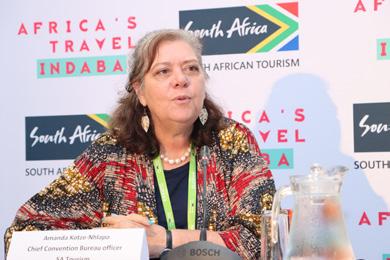
51 minute read
The Tourism shows are Back
The Tourism sector’s excitement following the easing of travel restrictions and return of tourism expos is a great impetus given to an industry which was at the receiving end of the ferocious coronavirus pandemic. The start of the second quarter saw destinations especially in Africa making bold decisions to save the sector from total collapse. This is not to suggest in the least that the woes of the sector are over but the return to trade shows is a muchneeded win which can spur and accelerate the restart. Exercising caution in opening the sector, event organisers and countries who took the very unpopular yet bold step in the revival of the industry deserve some deal of commendation. It ought to be mentioned that, regardless of the magnitude of the events held in these difficult times, it has contributed immensely to setting the scene for the shows to return, knowing that, this discipline of tourism is crucial to the revival of the industry. South Africa has become the epicenter of the MICE tourism restart as major events on Africa’s Tourism calendar have occurred in the rainbow nation.
Meetings Africa 2022 got the MICE events underway when it returned after 12 months in February and against what some pessimists referenced as a super spreader event. Thankfully, a significant number of African tourism players embraced it, and proved to be a blue-chip edition and which the stage for the return of live events on the continent.
Advertisement
The second major gathering of industry professionals was WTM Africa held in Cape Town from 11-13th April at the Cape Town International Convention Centre. The mixed (MICE and leisure) events offered hope for an industry which for 24 months has been disrupted negatively with remnants of it persisting. The Commercial Director of RX Africa (Formerly Reed Exhibition Africa) Papy Luzala organisers of Africa Travel week said, in as much as virtual platforms offered alternative, person to person could never be substituted for the former.
“The World Travel Market (WTM Africa) 2022 edition that took place in April this year in Cape Town, South Africa, marked a significant turnaround moment for live events in the travel and tourism sector, particularly for the African continent. Indeed, the event gave back hope to travel professionals who participated from across Africa and beyond for post-pandemic recovery in the sector, and also demonstrated the important role of face-face meetings for concluding business deals.” Papy observed. The leadership of South African Tourism (organizer of Indaba) made the bold decision to go ahead with the continent’s biggest leisure show Africa’s Travel Indaba in spite of the devastating effects of the torrential floods in the Kwazulu Natal Province. The industry indeed showed solidarity to the wonderful people of KZN and turned up in style. The Chief Convention Bureau Officer at South African Tourism, Amanda Kotze-Nhlapo at the recently held IMEX Frankfurt underscored the need for live events to return.
"Having been at IMEX for the past few days, the importance of business events globally was once again highlighted with a clear message that if we do not continue with physical meetings then we will not be injecting money into the economies of the various cities and countries. It was so
• The Commercial Director of RX Africa (Formerly Reed
Exhibition Africa) Papy Luzala • Amanda Kotze-Nhlapo, Chief Convention Bureau Officer at
South African Tourism

encouraging to hear most of our partners talking positively about South Africa and affirming South Africa’s business events strategy of focusing on key economic sectors.” The sheer numbers that congregated at the Durban ICC for the three-day travel and leisure exhibition is a further testament to how eager industry stakeholders are to make tourism work through networking facilitated by physical shows. President of the National Association of Nigerian Travel Agents (NANTA), Mrs. Susan Akpoyiare who attended the event with over 30 members underscoring the significance of in-person events said, “Can you have this feeling virtually?” She quizzed, adding, “Virtually, you can see but you need to experience it yourself because tourism is about experiences, and experiences are not built virtually. Virtually can give you an idea of what to expect but the real expectation is in the physical experience of it.” Jullian Blackbeard CEO of Africa’s Eden Tourism Association said ‘’In terms of shows, we believe that travel shows that are directed towards the trade are more important than ever in a recovery phase. They bring together the trade and the product after a long hiatus, often acting as a reminder of what people have forgotten and the new developments that have been happening. Saying that I think there is a changing trend in events, certainly for Africa, which is in-destination and is targeted at specific buyers/exhibitors. At Africa's Eden, our signature events are not free-flowing, expo-format but rather include structured education and site inspections, one on one meetings, and networking. We also award our exhibitors with the opportunity to invite their own buyers, and therefore the audience is by recommendation only and therefore more relevant and qualitative.’’ There is no denying the fact that the return of these shows will accelerate the recovery of the MICE sector and tourism business in general.
• The Executive Mayor of Cape Town cut the ribbon to open the Africa Travel Week 2022
Other events which have since returned included Africa’s Eden Show, (tourism), and the Karibu KiliFair Tourism Fair held in Arusha Tanzania. At the time of going to press, the Kenya Tourism Board had confirmed to the trade that, this year’s Magical Kenya Travel Expo is also back in October 5-7 in Nairobi. Zimbabwe's Sanganai Hlanganani World Tourism Expo is also set to make a return on October 13 – 15 this year with the continent’s premier aviation business, AviaDev 2022 earmarked for June 11 to July 1 in Cape Town, South Africa. It is important to highlight that the World Tourism Organization (UNWTO) impressed on governments to be bold in order to return tourism on track and itself held several in-person meetings in the heat of the pandemic in a safe manner, sending reassuring messages of opening up in a responsible way.
Again, it is instructive to stress that the return of travel shows is a real confidence booster for an industry that has suffered so much in the past two years, as these shows not only provide avenues for the industry to gather and do real business but opens the host countries up for buyers and patrons to explore and sample their tourism offerings.
So while we revel and jubilate over the resumption of travel shows, the caution word still remains safety, as we are not out of the woods yet. Therefore, while we learn to live with it in the new normal, let’s not forget to enforce and adhere to the necessary sanitary protocols whenever the need be.

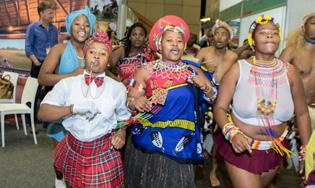
• Botwana’s stand at Africa’s Travel Indaba • Cultural Dance Group at this year’s Africa Travel Indaba
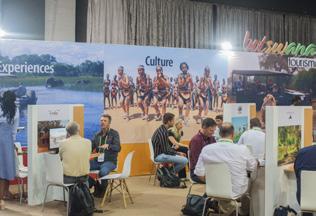

The number of signatories to the Glasgow Declaration on Climate Action in Tourism has passed the 500-mark, just four months after the landmark initiative was launched at the UN Climate Change Conference (COP26, November 2021). Today, and coinciding with International Mother Earth Day, the World Tourism Organization (UNWTO) has announced that Expedia Group, Booking Holdings and Condé Nast have become the latest signatories, joining stakeholders of all sizes and from every part of the diverse sector.
The signatures of three of the sector’s biggest names underscores tourism’s determination to accelerating climate action at every level and reflects the shared commitment of both big businesses and small stakeholders to work towards a common goal. All signatories of the Glasgow Declaration commit to the decarbonization of tourism operations and to restore and protect ecosystems, helping visitors and host communities experience better balance with nature. “Rebalancing our relationship with nature is critical to regenerating both its ecological health and our personal, social and economic well-being”, the Declaration states.
Cross-sector commitment
The 538 signatories of the Glasgow Declaration include all types of stakeholders, among them DRV German Travel Association, Tanzania Association of Tour Operators, the Caribbean Hotel and Tourism Association, PATA and Hostelling International; tour operators as EXO Travel, and Europa Mundo Vacaciones; accommodation providers such as The Cayuga Collection; DMOs such as Turismo de Portugal, Turisme de Barcelona, West Sweden Tourist Board, London & Partners, Destination Québec Cité and many more. All adhere to the guiding principle of restoring nature as a “key to our sector’s recovery from the pandemic, as well as its future prosperity and resilience”. UNWTO Secretary-General Zurab Pololikashvili says: “It is time to act. Tourism must prosper in harmony with nature, and the number and variety of businesses, destinations and other organizations signing up to the ambitious Glasgow Declaration on Climate Action shows our sector is committed to doing better. I am delighted to welcome Expedia Group, Booking Holdings and Condé Nast as the newest signatories.” Collaboration across stakeholders is key to ensure that the necessary skills, tools and knowledge are available among service providers, host communities and tourists so that they can deliver change. Among the priorities of the Glasgow Declaration for 2022 is to deliver guidance on measurement of emissions and climate action planning with support from working groups. “The need to address the damaging effects of climate change has become more urgent than ever before, which is why our Climate Action Plan includes ambitious targets, based on the latest scientific guidance, to achieve near-zero emissions for our own operations by 2030, and net-zero by 2040,” said Glenn Fogel, Chief Executive Officer of Booking Holdings. “Committing to the Science Based Targets initiative (SBTi) and Net Zero Standard, and now signing the Glasgow Declaration, is critical to ensure that climate action is supporting science and the Paris Agreement to change the trajectory of the current crisis.” “We are proud to become a signatory of the Glasgow Declaration for Climate Action in Tourism as part of a concerted effort with our partners and peers to progress a more sustainable travel industry,” said Peter Kern, CEO and Vice Chairman, Expedia Group. “As a travel company, we have the privilege of bringing people all around the world together every day. And as more people travel, we also have a responsibility to shift towards more sustainable operations to lessen our overall footprint and equip our travelers with sustainable options that match their values. We’re enhancing the visibility travelers have into their impact and offering more responsible choices. The industry must work together to help safeguard the future of travel for generations to come.” About the Glasgow Declaration on Climate Action in TourismThe Glasgow Declaration was launched at the UN Climate Change Conference COP26. It is a voluntary commitment which requests organizations to support halving emissions by 2030 and achieving net zero by 2050 at the latest; to deliver climate action plans (or update existing plans) within 12 months from becoming signatories and implement them; to align their plans with five pathways, namely: measure, decarbonize, regenerate, collaborate and finance; to report publicly on progress made implementing those commitments; and to work on a collaborative spirit. The Glasgow Declaration is led by UNWTO in collaboration with the Travel Foundation and within the framework of the One Planet Sustainable Tourism Programme. A full list of Signatories can be found here.
TOURISM GOVERNANCE UNDER THE SPOTLIGHT IN JEDDAH

Public and private leaders have been called on to unite behind the Jeddah Call to Action, a commitment to align with UNWTO’s approach to rethink tourism governance at every level to keep adapting to the challenges faced by tourism as a global driver for recovery. On the back of the 116th session of its Executive Council, held in Jeddah, Kingdom of Saudi Arabia, UNWTO set down a marker for the future of global tourism. With the pandemic having showed the systemic vulnerabilities of the sector, the United Nations specialized agency called for the construction of a new and reimagined system of governance and financing with the aim of building resilience against future shocks while also making tourism more sustainable.

Governance and visibility
In Jeddah, UNWTO continued with its tradition of complementing the important deliberations of its Executive Council with an open discussion on the biggest challenges and opportunities for the sector. The Forum "Tourism Futures – New Governance and Advocacy”, featured two distinct sessions - “Towards a New Tourism Governance” and “Raising Tourism’s Visibility” outside of the sector. “Now is the time to think big”, said the UNWTO SecretaryGeneral welcoming delegates and speakers. Zurab Pololikashvili stressed the need to “realize tourism’s unique potential to drive recovery, provide opportunity and build resilience, through better and stronger governance and focusing on jobs, training and education”. His Excellency Ahmed Al Khateeb, Minister of Tourism for the Kingdom of Saudi Arabia, commented: “We cannot recover backwards. Now is the time to capitalize on this heightened recognition and to position tourism as an essential pillar of transformation, development and opportunity.” The Minister also reiterated the Kingdom’s plans to invest US$100 million in training 100,000 young tourism workers.
Diverse voices around a shared goal
Illustrating the diversity of UNWTO’s Membership, the highlevel Thematic Debate featured contributions from Ahmed bin Aqil Al Khateeb, Minister of Tourism Saudi Arabia, Siandou Fofana, Minister of Tourism and Recreation Côte d’Ivoire, Carlos Peguero, Deputy Minister of Tourism, Dominican Republic, Tomohiro Kaneko, Vice Commissioner of the Japanese Tourism Agency, Najib Balala, Minister of Tourism of Kenya, Sofia Zacharaki, Deputy Minister of Tourism, Greece, and Tonči Glavina, State Secretary at the Ministry of Tourism and Sport, Croatia. Similarly highlighting the broadness of the sector and UNWTO’s reach of influence, the Ministers were joined by high-level representatives from business, destinations, media and communications, namely from Euronews, PRM Global, Interbrand, Netcom, Amadeus and the Diriyah Gate Development Authority (DGGA). Referencing the shared desire to get tourism moving again, Jerry Inzerillo, CEO of the DGDA, noted, “We may not share the same ideology, we may not share the same theology, but we share the same biology”, highlighting a universal desire to travel and connect with other cultures.
• Ahmed bin Aqil Al Khateeb,
Minister of Tourism Saudi Arabia
• UNWTO Secretary-General Zurab Pololikashvili speaking at the forum

Providing the perspective from the media, Ruth Wright, Head of Tourism and Lifestyle Verticals at Euronews stressed that viewers still demand certainty as the “perception amongst travellers is definitely still that travel is difficult and stressful.” As a result, content focused on rules and regulations remains relevant, even as human-led tourism stories becomes more popular. “Travellers are yearning to get back to the day when travel was fun, carefree and full of unexpected surprises,” she added.
From Jeddah to the world
With the discussions emphasizing the importance of taking a whole-government approach to tourism policy, with finance and interior ministries also part of the sector’s governance, Secretary-General Pololikashvili urged participants and all UNWTO Executive Council members advance this important agenda for positive change. The Jeddah Call to Action recognizes the vital need for more and better tourism governance, with targeted investments and a focus on building resilience, advancing sustainability and expanding education and training. It forms part of UNWTO’s wider work ensuring the recognition of tourism reflects the sector’s unique social and economic importance, including through making it a key part of the work of the United Nations and securing the cooperation of governments, international organizations and financial institutions.

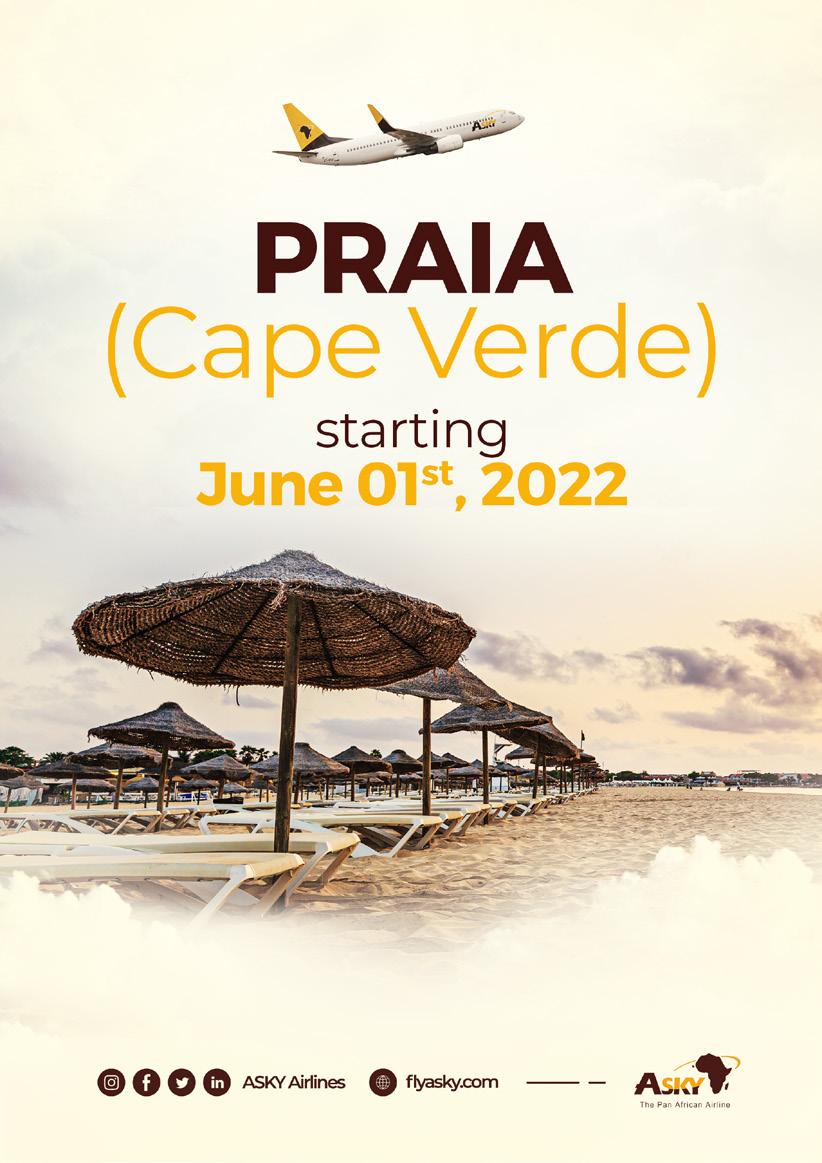
• Siandou Fofana, Chairman of the World Tourism
Organization(UNWTO) Executive Council
Let’s make Tourism Flourish - Siandou Fofana
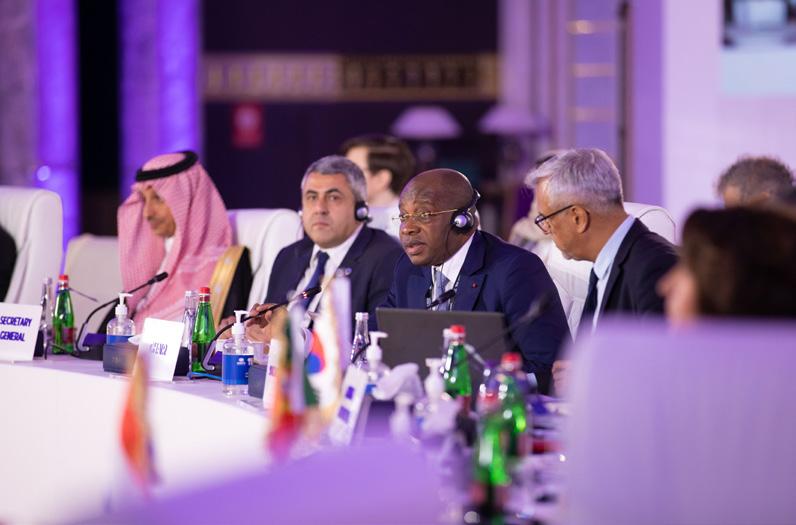
The Chairman of the World Tourism Organization(UNWTO) Executive Council, Siandou Fofana has admonished all players in the tourism sector to unite to ensure that tourism is back since it provides hope and livelihoods for many. Opening the 116th session of the Executive Council of UNWTO in Jeddah, Kingdom of Saudi Arabia, the Minister of Tourism and Leisure of Côte d’Ivoire said it was in the interests of all to make sure the ‘’people to people ‘’ sector survives.
‘’ In an increasingly globalised world, tourism has been acknowledged as an essential factor for growth. It is therefore in the interests of all of us, and of all the UNWTO Member States, to make it survive so that it can continue to prosper for the good of mankind. ‘’There is no need to stress that, over the last few years, tourism has been severely affected by the COVID-19 crisis, with a negative impact on our respective countries. However, tourism has proved to be an economically sound and resilient activity as well as an important lever for the recovery of commercial transactions on a global scale’’ Mr Fofana said. Rounding up his remarks at Tourism’s important decision organ of the Madrid-based UN Tourism Agency, Mr. Fofana expressed appreciation to the UN Tourism SecretaryGeneral Mr. Zurab Pololikashvili and his team for the remarkable commitments and efficiency shown in steering the affairs of the organization in the face of the dreadful covid-19 pandemic. ‘’I would like to thank the secretariat of the World Tourism Organisation and, more personally, its Secretary-General, Zurab Pololikashvili, for the energy shown and for the innovation and efficiency with which their demanding functions are carried out, allowing UNWTO, an important organisation, to fulfill its considerable responsibilities. ‘’ The Ivorian Tourism Minister on behalf of the members of the executive thanked the Kingdom of Saudi Arabia for the excellent hospitality extended to delegations who participated. ‘’I would like to express my gratitude to His Majesty King Salman Ben Abdelaziz Al Saoud of Saudi Arabia, and his Government, for the warm welcome we have received and for the facilities offered to ensure that our meeting is a success. ‘’
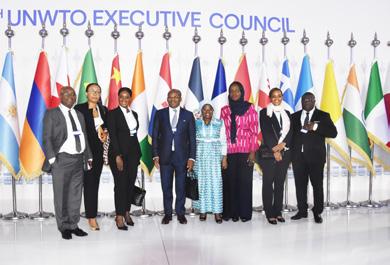
I would also like to thank all the delegations for their remarkable dynamism and the splendid work of coordination that has taken place to ensure the success of my term as Chair.
• Dr. Carlos Jorge Duarte Santos, Cabo Verde Minister of Tourism
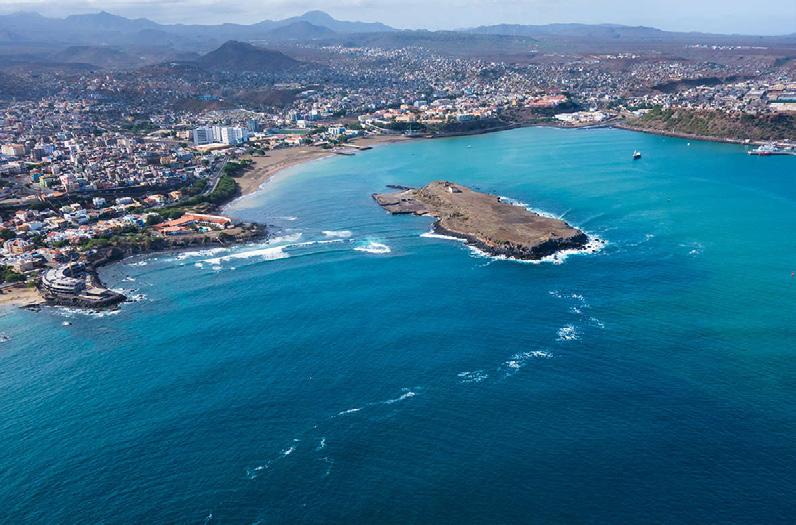
World Bank Supports Economic Recovery through Resilient Tourism and Blue Economy Investments in Cabo Verde
The World Bank has approved an International Development Association credit in the amount of US$30 million for the five-year Resilient Tourism and Blue Economy Development in Cabo Verde Project. Complementary cofinancing of US$5 million will be provided through a grant from the Global Program for the Blue Economy Multi-Donor Trust Fund.
Cabo Verde’s tourism sector has seen exceptional growth in the last two decades and is a crucial driver of growth and job creation, reaching an estimated 25 percent of GDP. The Covid-19 pandemic represented a major setback with arrivals collapsing by 75 percent in 2020, affecting tourism and ancillary sectors particularly hard. In addition to the unparalleled economic shock, the pandemic also highlighted structural challenges in the tourism sector, including overconcentration of arrivals in two islands and a single market segment, weak local supply chain linkages, and environmental sustainability issues—particularly in coastal areas. As authorities pursue a “build back better” motto, there is a real opportunity to address these challenges. In this context, the proposed project supports the national vision and strategies -namely the Tourism Operational Program and the National Investment Plan for the Blue Economy – to promote sustainable tourism and conservation of natural resources with benefit to local communities.
The project will thus contribute to critical objectives, namely improving the diversity of the tourism sector’s offerings across more islands and market segments (measured by an increase in average daily tourism spending and overnight stays in the targeted emerging destinations), as well as enabling greater participation and linkages of local communities in the positive economic spillovers brought about by tourism (measured by additional product and service supply contracts by local businesses in the hospitality value chain). The selected integrated and cross-sectoral project interventions for this first phase will span destinations in four islands (Santiago, Santo Antão, São Vicente and Sal) and will include: i) the development of selected resilient tourism and blue economy infrastructure (upgrading of trekking trails, heritage sites, seafront promenades, fishing piers and market, and a critical access road), ii) support to the local SME sector and women-led enterprises to provide demand-driven and sustainable services and products to the tourism value chain, leveraging particularly the potential associated with the blue economy in Cabo Verde; and iii) support to the enabling environment (including international destination marketing, enhanced policy and territorial planning, improved statistics collection, enhanced sustainability and management of tourism sites and services, and support to gender-informed mainstreaming and policies). “The World Bank is thrilled to support Cabo Verde’s vision and strategy for economic recovery and diversification by unlocking the combined potential of tourism and blue economy activities. The targeted investments in resilient infrastructure as well as the complementary interventions aimed at strengthening SMEs are designed to catalyze increased economic spillover from tourism across islands and market segments, all the while enabling better and more sustainable linkages and value-added for local communities and businesses.” said Eneida Fernandes, Resident Representative for Cabo Verde.

SEYCHELLES REMAINS A DESTINATION FOR ALL
The Seychelles Islands have been trending lately following the infamous account of an African American influencer who visited the destination briefly not long ago and said she was mistreated as a visitor.
The influencer’s article was posted at a time when she recounted her ‘bad experience’ over allegations of racism. She also said that her trip did not go as planned despite being a guest of Tourism Seychelles. Reacting to the article, Tourism Seychelles said it can very proudly say that it works with different black influencers from all over the world and always treats all its guests respectfully. The Director General for Destination Marketing at the Tourism Department, Mrs Bernadette Willemin, explained that there has never been any discrimination with regards to who they work with, and that besides hosting black press personalities, influencers, and bloggers, they also participate in marketing projects targeting the black communities or clients.
On the issue of Tourism Seychelles not honouring its part of the bargain with the influencer, Mrs Willemin said the influencer’s account is not correct.
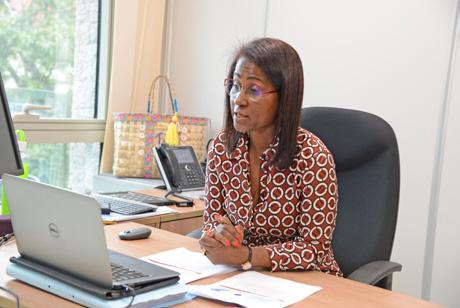
“This is quite unfortunate, considering the excellent reputation we enjoy with partners from all around the world. It is very important to note and put in perspective how far we can go when hosting our guests. Our overall spending for marketing activities is carefully budgeted for two main reasons: we are accountable to the government and taxpayers, and we must ensure that we spend wisely and even more important, we get the return on investment on every single project,” she explained. She continued that the destination is only able to work according to its resources, and in that context, it cannot fully sponsor influencers’ or press trips. “Aside from our usual collaborations on media and educational trips, like most destinations, influencer promotion is part of our marketing mix to help boost Seychelles’ visibility. The scope of our work is quite wide. We receive a high number of requests for collaborations every year. Our commitment to work with an influencer will be based on a strict vetting system where we not only assess his/her engagement or followings but also ensure that his/her focus align with ours as a destination and fit our marketing strategies.” The Tourism DG further explained that since the beginning of the year, Tourism Seychelles has received over 30 requests for collaboration per market, and that is from some 20 markets. When hosting an influencer, she noted, they often have to pay for the accommodation, meals, transfers, excursions, and tours as well as other ground logistics to ensure the guest has a memorable stay on our islands. And in return for this, they expect the commitment and coverage, or exposure promised as part of the agreement. It is to be noted that there is always an agreement between the department and the guest to ensure that the sponsorship or hosting of the trip is clear for both partners. Mrs Willemin concluded that every partnership with an influencer is carefully evaluated and weighed against its return on investment and there has always been good collaboration with the partners. “Always in keeping with our strategies, whenever we are contacted by an influencer, we first see if they fit our criteria. If yes, we engage in further negotiation as to what we can offer or sponsor towards the trip. Same process was applied with Ms Akinyemi and our agreement was to collaborate with her by offering a few excursions. There was no commitment of any other services. To assist her with ground logistics, our team had put her in contact with other partners for her bookings and we did follow up with her on several occasions for her itinerary so that we could arrange her excursions according to her programme. We received no response from her,” she explained. Mrs Willemin said it was regrettable to read such an article now as it not only attempts to paint a bad image of the destination but also disheartens the staff who work tirelessly to make sure they treat all guests respectfully, regardless of where they come from. “We remain very proud ambassadors of our destination,” she said.
• Mrs Bernadette Willemin
The Director General for Destination Marketing at the Tourism Department
New Malawi Tourism Masterplan provides an open door for investment – Minister
Malawi’s Minister of Tourism, Culture and Wildlife, Dr. Michael Usi has emphasized that the country’s recently launched tourism master plan will give leeway for investments into the sector.
The southern African country’s President, Dr. Lazarus Chakwera unveiled the audacious $660 million plan last April with the ultimate aim of developing the needed infrastructure and plans to boost tourism. In an interview for the VA Tourism Podcast during this year’s Africa’s Travel Indaba in Durban, South Africa, Dr. Usi mentioned that masterplan seeks to address challenges that are currently prohibitive to courting investments into the country’s tourism. “What this blueprint of the tourism masterplan will do is to inform the investors about the requirements for the investor to come to Malawi to invest. We are coming from a background where there are so many bottlenecks, and for an investor to come to Malawi, sometimes it takes two years for them to get license, to get accepted and we are removing all that. We want, when an investor comes, for example to get feedback within seven days, and in less than a year, may be six months at most, if the feasibility is done and everything is done, the investments should be on the ground. “The masterplan will also illuminate the gaps and challenges in investing in the sector. We would want the investor to know the challenges we have had in the past for us to realise the full potential in the tourism dividends. We are also looking at a three-dimensional approach where all the stakeholders must come together and form a fabric that act as tourism marketing strategies and implementation,” he stressed.
The all-encompassing plan has provision for the development of aligned sectors such as wildlife, culture and hospitality. The strategy is to use tourism to precipitate a multiplier effect on other sectors of the economy, while decentralizing distribution of wealth and deepening the creation of it.
The Minister posited, “We are envisaging in the future, as a preferred future benefit, to develop because each of the 10 tourism nods in the plan is going to support other projects which aligns with Malawi’s Vision 2063 (MW2063). In the meantime, marketing and promoting the country, Dr. Usi disclosed, is a key priority for getting the destination out there within the short term.
“The area in which we are putting much energy is marketing. We need the outside world to know what Malawi is offering; talk about Lake Malawi which is a beautiful lake but hasn’t fully been explored for its tourism potential, talk about our game parks and culture. The cultural authenticity is what impregnates the beauty of it all. “When you come to Malawi and you visit areas where our culture is being showcased, you’d see that you’ve never been anywhere like that. What we envisage in the near future is to have a domain where if somebody anywhere in the world is asked about a must-visit destination, if he or she doesn’t mention Malawi, it’s by choice not that he doesn’t know because we made the loudest noise which is relevant,” he emphasized.
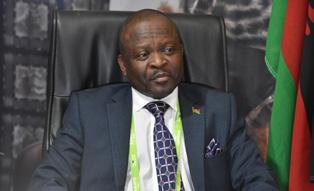
• Malawi’s Minister of Tourism, Culture and Wildlife, Dr.
Michael Usi
• Malawi’s Minister of Tourism, Culture and Wildlife, Dr. Michael Usi welcomed UNWTO Regional Director, Elcia Grandcourt during Africa Indaba
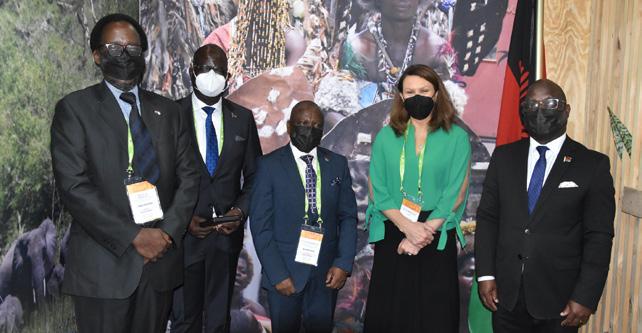










Why Destination Marketing Organizations hold the key to the recovery of aviation in Africa
I have dedicated the last 10 years of my life to the world of route development, supporting organizations around the globe to improve their air connectivity with a particular passion and focus on Africa. Whilst much of the connectivity that has been built over the last 25 years was eroded by the pandemic, the resurgence of air traffic since restrictions were lifted has been beyond expectations. Whilst airlines have received most of the press coverage about how difficult their situation is, and are also those who have received the most financial support, airports have also been hugely impacted. In Africa, many airports do not have large enough operations to have diversified to create a decent revenue stream from non-passenger revenues. Therefore, they are dependent on revenues tied directly to aviation activities and passenger throughput. Understandably, across the continent, this revenue has declined massively since the onset of the pandemic, but airports remain vital pieces of a country’s infrastructure and still need to find the funds to ensure a safe operating environment. In summary, a huge amount of an airport’s operating expense has remained whilst revenues have dwindled. Added to this, many countries in Africa have not created a separate airport authority and operate with just a Civil Aviation Authority. This is an important point, as it is the airport authority that should have a commercial focus and proactively look for opportunities to increase its revenue through attracting new airlines and supporting existing ones to develop their operations, which is what we facilitate at AviaDev Africa.
Top of that list of activities should be to attract an airport’s biggest customer, namely airlines as they not only deliver revenue for the airport but a much bigger impact on the destination they serve. So where do the DMOs fit in? According to the UNWTO (United Nations World Tourism Organization), in 2017, 57% of all tourists globally arrived at their destination by air. Therefore, it’s not a quantum leap to suggest that a Destination Marketing Organization’s most important customer is the airline as without them, the majority of tourists cannot visit the destination.
To continue this line of thought, it makes sense that tourism bodies should work closely alongside their airport authority to attract the airlines. So why then, in my personal experience, do the vast majority of DMOs claim that dealing with airlines is the airport’s job and they don’t have a direct relationship? If airlines bring over half of the tourists to your destination, as a DMO, do you not have an obligation to keep them happy and try to develop new airline relationships?

• Jon Howell,
Founder of AviaDev Africa
“AN AIRLINE FLIES TO A DESTINATION, NOT AN AIRPORT”
Over the last 10 years, we have delivered training courses for tourism authorities, provided free access to attend events alongside their airports but the uptake has been limited, perhaps due to the misconception that only airports should talk to airlines. I want to stress that this disconnect is not unique to Africa, but now is the time to change that. So how do we bring this change? The answer is simple. Integrate strategies and collaborate. We have already established that airports are under financial pressure and I would venture that it is likely that DMOs will receive financial support before the airports and will be charged with bringing back the tourists. DMOs should be looking to support their airports to build a business case in the airline’s source market and even support the new route with marketing support and even financial means (within the rules and where affordable). If I haven’t convinced you yet, ask any airline what they are looking for when they receive a proactive approach from an airport/destination. Their answer will include a multiple stakeholder approach that engages multilaterally as CAA, Airport Authority and DMO to create a compelling argument to launch a new route and that illustrates how they will support its success. The future will be competitive as all destinations look to rebuild and those that adopt a proactive and collaborative approach to route development will recover fastest.
If want more insight on the African aviation industry, check out the AviaDev Insight Africa podcast at or on all podcasting platforms
New CEO of Zimbabwe Tourism Authority promises close partnership with Media to promote destination
The Zimbabwe Tourism Authority (ZTA) has named seasoned tourism practitioner Winnie Muchanyuka as the substantive Chief Executive.
Ms. Muchanyuka replaces Dr. Karikoga Kaseke who resigned last year due to ill health. She takes over from Mr. Givemore Chidzidzi who has been with ZTA for the longest and also in his acting capacity as CEO.
Announcing the appointment, ZTA board chairman Mr. Raynold Mawerera commended Mr. Chidzidzi for holding forte in the past months. Mr Mawerera commended Mr Chidzidzi under whose leadership and guidance ZTA steered on a positive trajectory. He mentioned the successful launch of the ZimBho domestic tourism campaign and the Meetings, Incentives, Conferences, and Exhibitions (MICE) initiative as some of Mr. Chidzidzi’s career highlights. Environment, Climate, Tourism, and Hospitality Industry Minister Mangaliso Ndhlovu hailed the appointment of Muchanyuka as a step in the right direction. “The appointment of Winnie Muchanyuka to the ZTA as CEO is apt in that she is not a stranger to the tourism industry. The industry awaited the appointment with comfort. There are high hopes for tourism amid clear signs of recovery in the sector. Statistically, the first quarter of 2022 has been quite promising and there is a need to maintain that trajectory. “Tourism inflows increased by 100 percent to register US$214 million this quarter. As we are opening up the sector, the tourism industry should grow bigger and bigger. ZTA is the critical bridge between the private sector and policymaking. “Despite the fact that tourism struggled under COVID-19, there is hope for it to grow bigger. The US$5 billion tourism sector target is achievable if we work together collectively. We seek to review the targets only upwards. Tourism is the face of the country, the key voice of our country. The ZTA and the tourism sector should forge close ties with the media. To the ZTA CEO and entire management, I urge your dedication towards growing the industry and to embrace success as we march towards the 2025 target of a US$5 billion tourism economy,” Hon Ndlovu said. Ms Winnie as she is affectionately known in the industry, accepted the appointment with joy adding that she was happy to ride on the success of her predecessors. “The ZTA Team has done and continues to do tremendous work towards growing the tourism industry. I pledge my support to the mandate given to me by the Principal, Honourable Mangaliso Ndlovu, the tourism minister and the US$5 billion tourism target he alluded to is not changing. “In fact, we can surpass it. Zimbabwe needs to achieve a middle-income economy by 2030 and tourism plays a key role in achieving that goal. I am also looking forward to a close partnership with the media in telling the good story of this country. I am excited to be starting on this journey,” Muchanyuka said. Hon Barbra Rwodzi, the Deputy Minister of Environment, Climate, Tourism, and Hospitality Industry congratulated the new CEO of the ZTA and alluded to the full stakeholder representation at the announcement of her appointment as a clear sign of endorsement of her new role. She encouraged stakeholders to open doors for ZTA through collaboration, and partnerships while working closely with the media as well. This, she said, should be done in the spirit of the ‘Zimbabwe is open for business’ mantra through tourism. Muchanyuka brings a wealth of experience to the ZTA. She was on the board of the Tourism Business Council of Zimbabwe and the Chinhoyi University School of Tourism. She has vast experience in the aviation industry with a stint as an air hostess for Air Zimbabwe and Swiss Air. She also worked as an executive for the South African Airways.

Mesfin Tasew Bekele,
the new face of Ethiopian Airlines
Africa’s biggest and leading Airline Group has ushered in a new leadership after its illustrious and legendary former CEO Ato Tewolde called time on his stewardship to an end on health grounds. It was indeed a shocking news to the aviation sector and news world, the sudden announcement on his resignation. He paid his dues and his sterling leadership ensured the airline improved its profitability, grew its fleet, operations and above all bagged countless awards for the pan African airline.
With a robust and impressive succession plan for the Ethiopian carrier, the management and Board of the airline Group announced another veteran in the top echelons of the airline, Mr. Mesfin Tasew Bekele as the new Group CEO of the company. Mr. Mesfin has 38 years of experience in airline management and operations in the areas of aircraft maintenance and engineering, procurement, information technology, flight operations, capability development, capacity building, development of corporate strategies, airline operation management, and corporate leadership. He earned a Master’s in Business Administration (MBA) from Open University in the UK, an MSc degree in Electrical Engineering specializing in Communications Engineering from Addis Ababa University, and a BSc degree in Electrical Engineering from Addis Ababa University. Aviation Juggernaut and Board Chairman of Ethiopian Airlines Mr. Girma Wake in congratulating Mr Bekele said he was confident in the capabilities of the new man and believes Mr. Mesfin will lead the airline to even greater success, keeping it on the right track that will see it grow through many generations to come. I urge the 17,000 employees of Ethiopian and the board members to stand with the new Group CEO to keep the airline fly high. We are also thankful for the remarkable contributions of the former Group CEO.” Mr. Mesfin Tassew on his part said, “I am honored and humbled to be appointed as the Chief Executive Officer of Ethiopian Airlines Group which I have been serving for nearly four decades in various positions. My new role gives me the opportunity to carry on with the fast and profitable growth of our beloved airline and take it to the next level. I call on all my colleagues at Ethiopian to join hands and forge ahead for further success.” years of service, Mr. Mesfin has been a key player responsible for planning and execution of strategies that led the airline to shine in the African skies and beyond. He assumed responsibilities including but not limited to overall maintenance of Ethiopian fleet, capability and capacity development, leading the automation project of the Maintenance and Engineering Division, and managing projects related to aircraft acquisition. Profile
Mr. Mesfin has been serving as a Chief Executive Officer of ASKY Airlines since 2021 and has led the airline with a profitable growth strategy until the time of his new appointment. He served as a Chief Operating Officer of Ethiopian Airlines from 2010 –2021 and successfully led the operation of the airline in an efficient and cost-effective way by optimizing processes and developing internal resources to cope with the airline’s growth strategy. Besides, he was Vice President of Maintenance and Engineering from 2006 –2010; Chief Information Officer from 1998 – 2006; Manager of Planning and Automation, Maintenance and Engineering Division from 1995 – 1997; and Avionics Engineer and Supervisor Avionics Engineering Group from 1984 – 1994.
He took part in numerous local and international seminars in the aviation industry and general leadership. He received training in leadership and airlines operations management,aviation regulations and aircraft maintenance among others. In 1984, Mr. Mesfin was a gold medal award winner of Addis Ababa University Faculty of Technology as an Outstanding Graduate of the Year. We sat down exclusively with the new man on the
I am honored and humbled to be appointed as the Chief Executive Officer of Ethiopian Airlines Group which I have been serving for nearly four decades in various positions. My new role gives me the opportunity to carry on with the fast and profitable growth of our beloved airline and take it to the next level. I call on all my colleagues at Ethiopian to join hands and forge ahead for further success.
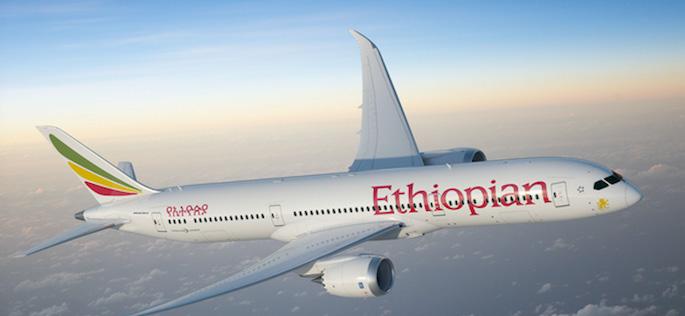
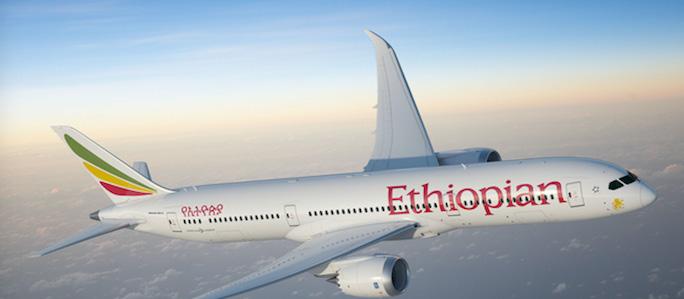
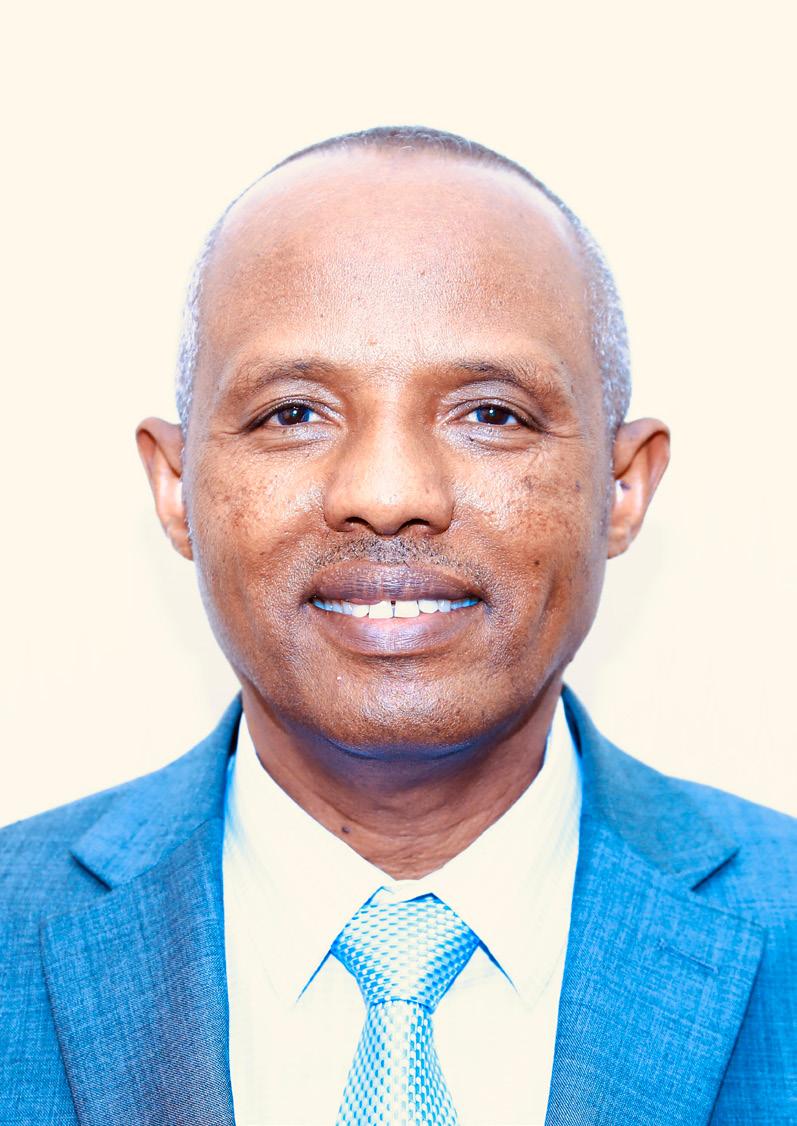
• Mesfin Tasew Bekele
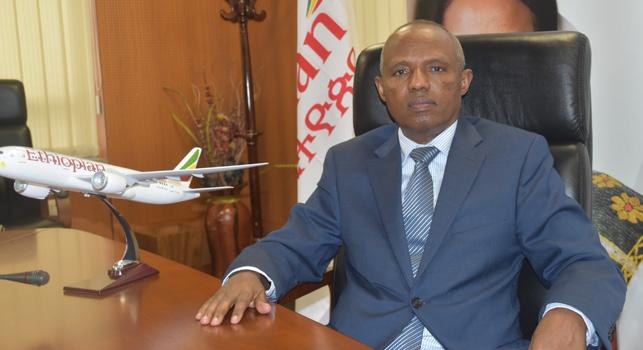
block to get to know more about his aspirations for Ethiopian Airlines. First, he is bent on continuing with the airline’s growth strategies. “If you see the history of Ethiopian Airlines, it is a long history of success, and one of the contributing factors to this success is; the leadership succession strategy. We pick people who have grown within the company, worked for a long period of time, gained experience with the airline, and replace those who leave at the top. My appointment as CEO of Ethiopian Airlines was based on that succession strategy. As I mentioned to you earlier, I have been sitting in the executive management team at least for the last 17 years in different capacities. For instance, Head of IT , Head of Maintenance, Chief Operating Officer and now the CEO. So I participated actively in those critical decision making proceses such as in planning, and infrastructural development. “I am not new to this position that’s one. Secondly, all those leaders who have been leading the company, follow the company's long-term strategic road map and I will follow that. So we have the vision 2025 now and we have set vision 2035 and I am going to strictly follow the implementation of that strategy which is an expansion of infrastructure, continuous modernization of aircraft and human resource development. And adopting the strategy of the company with the continuously changing business environment around the world.
So our focus now here will be number one; developing internal capacity along five pillars so that when a storm comes we can sail through. When you have the internal structures, you will not be affected significantly by external factors. Secondly, we would continue to improve our customer service. We will continue following these principles to provide worldclass global standard services to our esteemed customers.”
At the core of the airline’s Vision 2035, Mr. Tasew said, is sustainability through a diversified business model. “The basic elements of Vision 2025 are still valid in vision 2035. Just to mention some of them; our key guiding principle is fast, profitable, sustainable growth which has been our guiding principle in our vision 2025. In addition to that, as a group, we will follow a diversified business model. Now there will be eight, adding some more business units to it. In vision 2025 we didn’t have the Airports as one business unit but now we have added that with the expansion strategy in Ethiopia. So we will still continue following the diversified business model. And in Vision 2025 we had four pillars of growth infrastructure development, fleet renewal and expansion, human resource development, and systems development. We were focusing on these. “In Vision 2035, we added one more pillar which is sustainability. Our business strategy and our business model must survive by themselves. In the past, in Vision 2025 we basically followed our motto of being a four-star airline with five-star service delivery that has African hospitality. In Vision 2035, we also incorporated this. So, it is an extension of the current strategy but scaled up with a bigger portfolio. So we will be expanding our network throughout the world and our service will be a global standard service with African hospitality,” he emphasized.
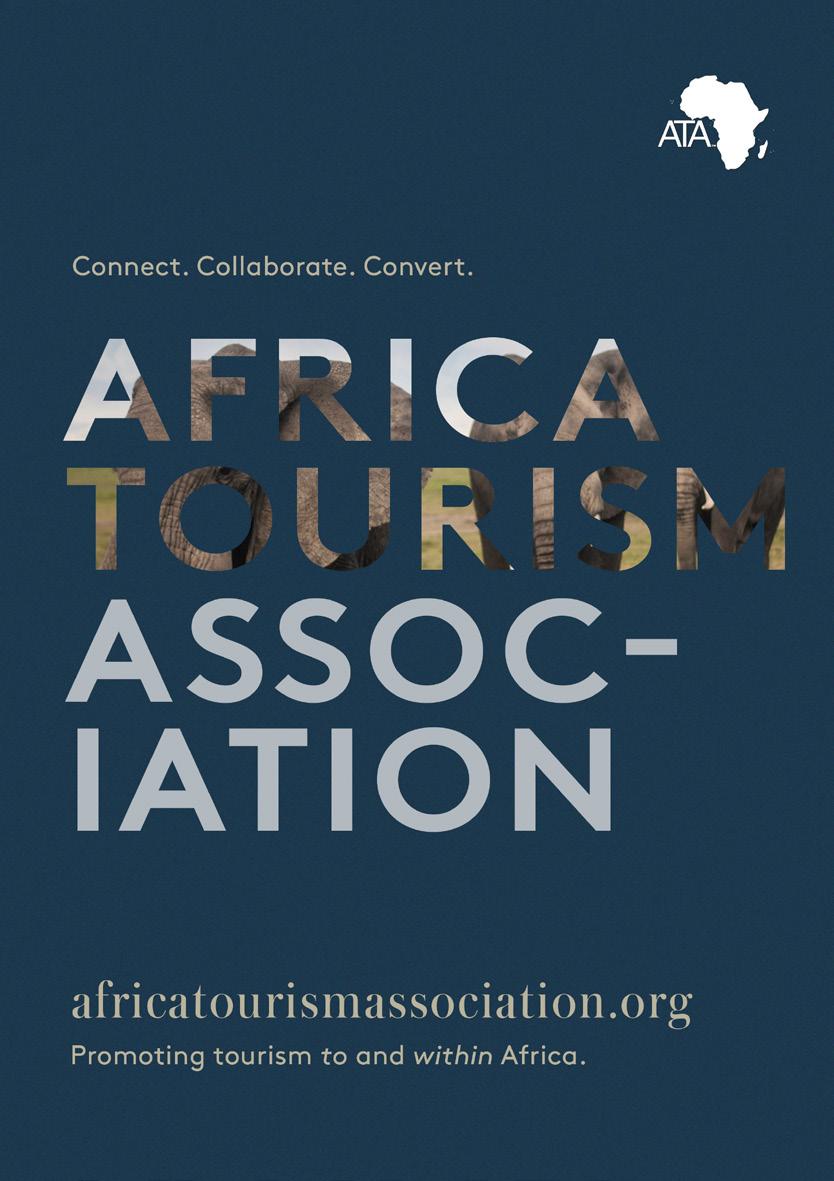
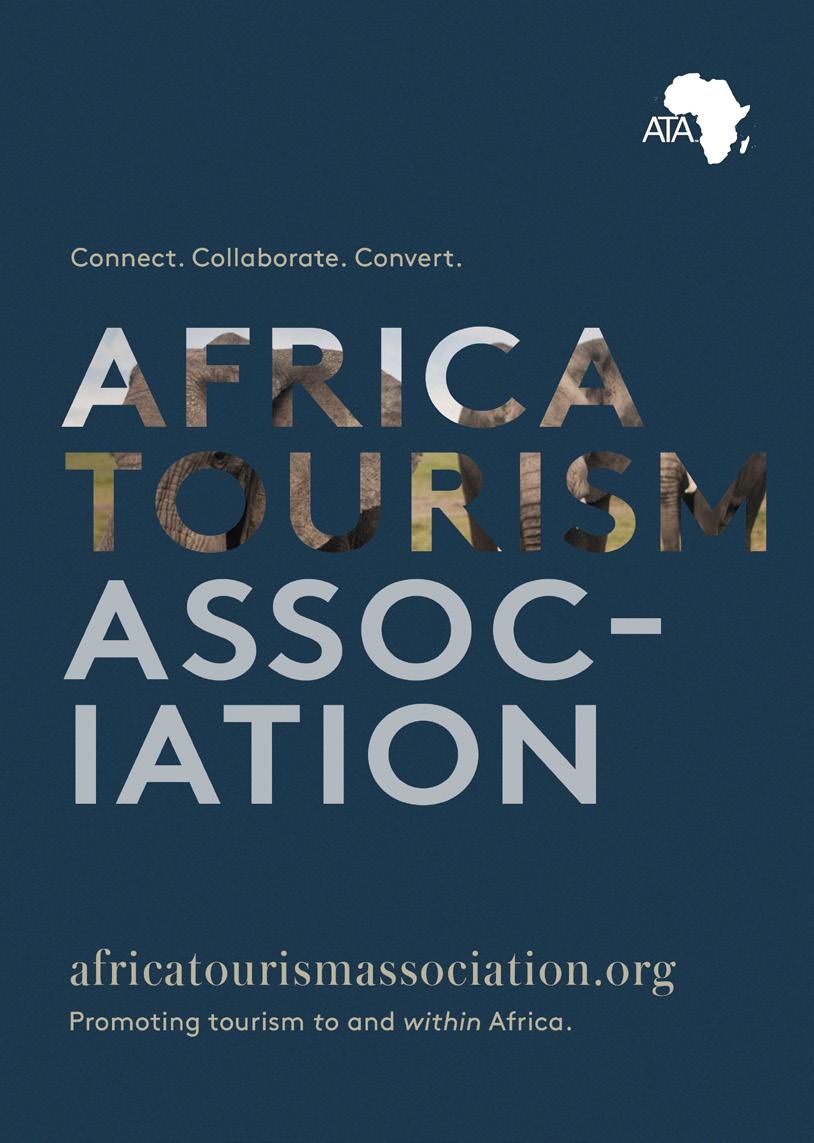
Africa’s travel and tourism trade will be key to South African Airways’ strategy in connecting the continent. The Airline’s Commercial Director Simon Newton-Smith has said.
The Airline in a breakfast meeting with trade partners and stakeholders on the sidelines of Africa’s Travel Indaba revealed several initiatives the carrier has embarked on since its return to the skies on September 23, 2021. Addressing the issues at the breakfast engagement, Simon Newton-Smith said, it’s been tough 2 years for every business and SAA was happy to have relaunched to bring competitive services to the travel market. ‘”The travel and tourism trade will be front and Centre of SAA’s plans and by so doing the airline will be able to incorporate some services the market demands. “Our primary focus is building our network in Africa and that will also mean doing the simple things right. “It’s our job as African airlines to connect the continent; thus, the collaboration and partnership will be essential ingredients in making travel seamless in the region.” Touching on the recently announced partnership deal with Kenya Airways, Mr. Newton-Smith said plans are far advanced and barring any unforeseen eventuality by June 2023, SAA and KQ would have harmonized network pricing which will guarantee far better connectivity than we have now.
The partnership with Kenya Airways is one of the many initiatives the SA flag carrier is looking at in Africa to reach the length and breadth of the continent. The Commercial Director of SAA also paid glowing tribute to Former CEO Thomas Kgokolo for his sterling leadership and professionalism in overseeing the restart of South African Airways. The Airline currently operates international flights from Johannesburg to (JNB) to six African capitals: Accra (ACC) in Ghana, Lagos(LOS) in Nigeria Kinshasa (FIH) in the Democratic Republic of the Congo, Harare (HRE) in Zimbabwe, Lusaka (LUN) in Zambia and Port Louis (MRU) in Mauritius.
• Simon Newton-Smith
• President of National Association of Nigerian
Travel Agents Mrs. Susan Akpoyiare speaking at the breakfast meeting
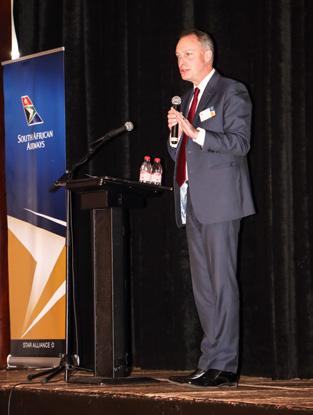

Ethiopian Airlines places order for Five B777 Freighters
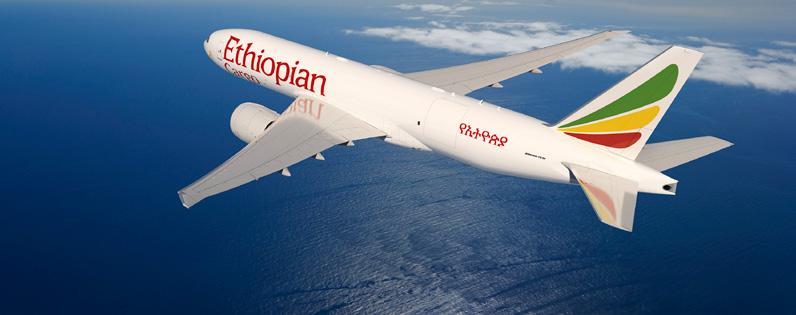
Ethiopian Airlines, the largest and leading aviation group in Africa, and its longstanding partner, Boeing Inc. have announced the carrier is further expanding its all-Boeing freighter fleet with an order for five 777 Freighters (current freighters). Ethiopian Airlines Group CEO Mr. Mesfin Tasew said ”The addition of these five B777 Freighters into our cargo fleet will enable us to meet the growing demand in our cargo operation. While cementing our partnership with the Boeing Company with new orders, the growth of our freighter fleet takes the capacity and efficiency of our shipping service to the next level. We always strive to serve our customers with the latest technology aircraft the aviation industry could offer. Our Africa’s largest cargo terminal coupled with fuel-efficient freighters and well-trained cargo handling professionals will enable our customers get the best quality shipment service. Customers can rely on Ethiopian for wide-ranging cargo services across five continents.”
Boeing’s market-leading 777 Freighter is the world’s largest, longest-range, and most capable twin-engine freighter currently flying with 17% lower fuel use and emissions compared to prior airplanes. Ethiopian Airlines currently operates a fleet of nine 777 freighters, utilizing a range of 4,970 nautical miles (9,200 km) and a maximum structural payload of 107 tonnes (235,900 lb) to connect Africa with 66 dedicated cargo centers throughout Asia, Europe, the Middle East and the Americas. Ethiopian Cargo and Logistics Services cover 127 international destinations around the world with both belly hold capacity and dedicated freighter services. “We value the trust that Ethiopian Airlines places in the 777 Freighter to support their cargo ambitions which will provide them with increased capability and flexibility to their operations,” said Ihssane Mounir, Boeing’s senior vice president of Commercial Sales and Marketing. “Additional 777 Freighters will enable Ethiopian to capitalize on nearterm cargo demand while positioning the airline for further expansion in the future.” In early March 2022, Boeing and Ethiopian Airlines also announced the signing of a Memorandum of Understanding with the intent to purchase five 777-8 Freighters, the industry’s newest, most capable and most fuel-efficient twin-engine freighter. Ethiopian Airlines also operates three 737-800 converted freighters, as well as a combined passenger fleet of more than 80 Boeing jets including 737s, 767s, 787s and 777s. Ethiopian Airlines (Ethiopian) is the fastest growing Airline in Africa. In its seventy-five years of operation, Ethiopian has become one of the continent’s leading carriers, unrivalled in efficiency and operational success. Ethiopian commands the lion’s share of the Pan-African passenger and cargo network, operating the youngest and most modern fleet to more than 130 international passenger and cargo destinations across five continents. Ethiopian fleet includes ultra-modern and environmentally friendly aircraft such as Airbus A350, Boeing 787-8, Boeing 787-9, Boeing 777-300ER, Boeing 777-200LR, Boeing 777-200 Freighter, Bombardier Q-400 double cabin with an average fleet age of seven years. Ethiopia is the first airline in Africa to own and operate these aircraft.
Ethiopian Airlines is Outstanding Airline Brand of the Year
The largest airline in Africa that flies to over 124 countries from Ghana via its hub in Addis Ababa, was recognised for its consistent performance during the difficult period in 2021 and for its dedication to the Ghanaian and West African market in general. “We are happy to have been recognised for our work and we will work to do more in the years ahead,”Yemesrach Alemayehu, Area Manager of Ethiopian Airlines said. In Ghana, Ethiopian Airlines and Asky Airlines are all set to start Accra-Washington Flights via Lomé on June 1. The new service is expected to provide more travelling options to Ghanaian passengers and lead to competitive pricing on the route. “ET is pleased to introduce this direct service from Lomé to Washington giving additional connective between West Africa and USA in connection with ASKY.
The Washington service is added to the daily flight we currently have to New York giving better travel alternative to USA,” Yemesrach Alemayehu, Area Manager of Ethiopian Airlines said.

Cape Town Air Access celebrates increased air connectivity to Western Cape
Cape Town Air Access – the award-winning air-route development project responsible for establishing direct flights that connect Cape Town and the Western Cape with the rest of the world – held their Annual Review Showcase. The celebratory event was well-attended by key government partners, business stakeholders and airline professionals. The team used the opportunity to highlight its achievements over the last year, in the face of adversity caused by the global COVID-19 pandemic, and also prompted an important discussion about what it must do to do to ensure it builds on these successes in the future.
Forming the focal point for proactive air route development in Cape Town and the Western Cape, the team assisted in relaunching flights to Cape Town International Airport from 23 international destinations, served by 18 international airlines during 2021. Domestically, connections to all 13 pre-pandemic destinations have been re-established for Cape Town International Airport, served by seven local airlines. Four airlines are also operating out of George Airport to three domestic destinations. Highlights for the past year included: Flights to 11 out of 13 pre-pandemic African destinations have been re-established for Cape Town International Airport. The announcement that the AviaDev Africa route development conference 2022 will return to Cape Town for the third time from 29 June to 1 July, hosted by Cape Town Air Access, which will welcome 250 route development, representatives from 60 countries, including representatives from 40 airlines. Intercontinental flights to Cape Town are also at the forefront of more sustainable long-distance flights with almost 75% of carriers opting to operate new generation Airbus A350 or Boeing 787 Dreamliner’s into the destination.
Opening the session, Wrenelle Stander, CEO of Wesgro and the Official Spokesperson for Cape Town Air Access, commented: “Going into 2021 we understood that we were competing in the global race for routes against major destinations around the world. The reestablishment of 23 international routes signifies our position as a competitive and attractive destination. Cape Town Air Access, along with partners, remains commitment to air route network recovery and contributing to economic recovery – which has been critical to the achievements we are seeing today. We are excited about the prospects of the coming year and the significance of greater air connectivity for the Western Cape’s global competitiveness”. Deputy Director-General: Economic Development and Tourism, Western Cape Government, and Cape Town Air Access Co-Chair, Rashid Toefy, said: “The recovery of the Western Cape economy has been the key focus since the beginning of the pandemic, and securing non-stop direct flights to a set of strategic destinations across the world has been one of our main focus areas. Collaborative efforts such as Cape Town Air Access are an important aspect of the future growth of the Western Cape economy. The reconnection of air connectivity and the steady recovery of travel is a testament of the impact of collaborative effort.” Cape Town Air Access is an award-winning air-route development project, responsible for establishing direct flights that connect Cape Town and the Western Cape with the rest of the world.
The project is housed within Wesgro – the official tourism, trade and investment promotion agency for Cape Town and the Western Cape and is an impressive collaboration between six government entities – the Western Cape Government, City of Cape Town, Cape Town Tourism, South African Tourism, Airports Company South Africa and Wesgro – as well as selected private sector partners including Investec, DHL Global Forwarding and the V&A Waterfront.
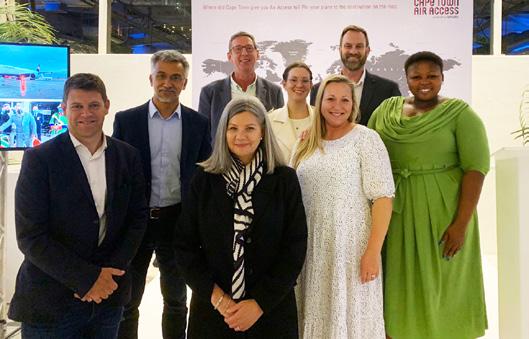
Seychelles International Airport digital transformation boosts arrival processes
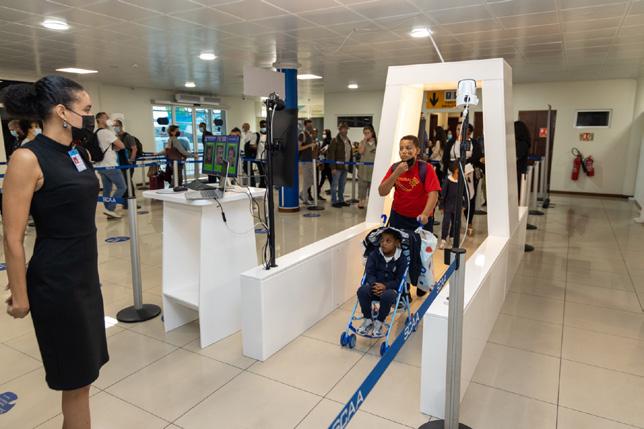
Travizory Border Security Platform used for digital immigration screening as part of ongoing modernisation agenda Seychelles Civil Aviation Authority (SCAA) recorded its fastest ever screening times for arrival passengers in March this year - with all necessary checks such as Health, Immigration, Customs and baggage claim completed in just 35 minutes per 100 passengers. Health screening alone has dropped from 55 minutes to just 8 minutes per 100 passengers, while the time to process 100 passengers for Immigration has dropped 50% from 41 minutes to 20 minutes in the same timeframe.
Crucially, this sees the SCAA well on-track to reach the ICAO standard for overall passenger processing of 45 minutes with 61% of flights processed within this target. This success follows the digitization of the Immigration processing system and the integration of the blue disembarkation card into the Seychelles Islands Travel Authorization platform, powered by Travizory Border Security. As of 21st February, passengers at Seychelles Airport no longer have to present paper forms to Immigration or Customs Officers on arrival. Instead, a simple scan of their passport will arm Officers with the information needed to effectively profile and process passengers. As a result, travelers do not have to complete or present any additional paperwork to Seychelles Authorities once their Travel Authorization has been approved. As international travel picks up again, this will give greater confidence to passengers by guaranteeing a contactless travel experience, thus minimizing health risks by limiting interactions on arrival.
Mr. Colin Chang-Tave, the General Manager for Airport Management at the Seychelles Civil Aviation Authority, said:
“For the first time since the resumption of commercial flights in August 2020, the average overall processing time for arriving passengers was below the 45 minutes target set by ICAO. Currently, 61% of flights are processed within this target - firmly above the 21 % of flights that met this standard in August 2020.” Renaud Irminger, CEO Travizory Border Security said: “Travizory’s mission is to facilitate secure digital border crossings for travelers and governments - and the digitisation of the arrival experience at Seychelles Airport illustrates that a pleasant travel experience and robust security can go hand-in-hand."
Karibu Kilifair bounces back after two-year Hiatus

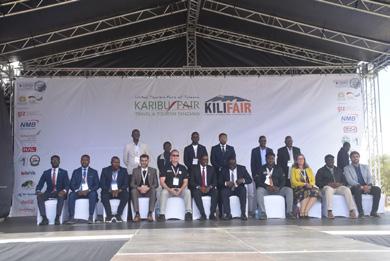
Karibu Kilifair made a triumphant comeback after a twoyear hiatus due to COVID-19 disruption. The International tourism & industry fair brought together exhibitors from different countries across the world at this year’s fair in Arusha, Tanzania from May 3-5, 2022. This year's event had over 500 exhibitors from 15 different countries, over 600 international Buyers from 45 countries, 8000 trade Visitors, 35.000 sqm Exhibition area, B2B Events, seminars, appointments, Entertainment, and Fashion Shows.
Dominic Shoo, Director, Killifair Co. Ltd, expressed gratitude to the Tanzania Ministry of Natural resources & Tourism, calling for continued investment in the fair as part of efforts to market the country. “Karibu Killifair is a big investment which has a multiplying effect not only on the economy of Arusha but on the whole country of Tanzania and East Africa at large. We ask the ministry to continue supporting us financially so we can continue to Market Tanzania and make Karibu Killifair the best platform for business networking worldwide. We and the world to come to Tanzania and become the Karibu Killifair of Tanzania. We also that you continue supporting familiarization tours as the number of participants continues to grow and to make sure travel agents visiting this fair become the best ambassadors of our attractions in Tanzania. This way we will meet our target of 5 million tourists per year”. Delivering his keynote address at the opening ceremony, Hon. Mashimba Ndaki, Minister for Livestock and Fisheries said “Tanzania is endowed with many tourist attractions which appeal to a significant number of tourists from many countries of the world. It goes without saying that through this kind of event, the tourism industry will quickly recover from the impact of COVID-19”. He explained that due to COVID-19, the number of international tourists to Tanzania decreased by 59% and revenue generated from tourist activities decreased by 72%. In response to this, the Tanzanian Government has taken several steps towards recovery including enhancement of destination marketing through different platforms within and outside the country. In view of that, Karibu Killifair came at the right time and is aligned with the government's effort toward the development of the tourism industry in Tanzania. As a government, we will continue supporting this fair financially and the Ministry of Natural Resources and Tourism will make sure that it is fully engaged”. Meanwhile, the Deputy Secretary-General of the East Africa Community (EAC), Hon. Christopher Bazivamo also acknowledged the role of events such as Karibu Killifair towards the wholistic improvement of tourism across the region and aligns with the EAC’s main interest is to ensure that East Africa is marketed as one destination to benefit the region at at-large. " We are at the point of bringing in South Sudan and they are here as well, the next block is the Republic of Congo to ensure that we have a higher piece of the bar to share within the region. Conservation cannot be done in one country; it must be done across the region and must share the same standard within that region”. The fair was also an opportunity for exhibitors and buyer to have the opportunity to visit some of Tanzania’s tourism hotspots and other social activities lined up for the fair. This year’s edition of the fair was supported by the Ministry of Natural resources & Tourism, GIZ, Tanzania Association of Tour Operators, NMB Bank, Ethiopian Airlines, Air Tanzania, Coca-Cola, DPO Group, Voyages Afriq and several other entities.




